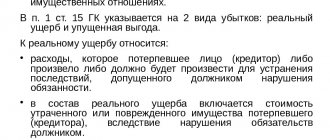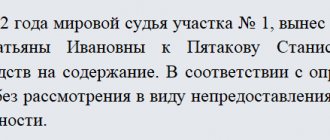The concept of compensation for moral damage as a way to protect civil rights
The main constitutional provisions of our country provide that the state is obliged to provide the victim with access to justice, as well as compensation for damage, both moral and physical.
Moral harm is a certain form of physical or moral suffering that a citizen experiences as a result of violation of his civil rights and freedoms. In our country, the institution of moral damage has existed for quite a long time, but is still considered one of the most unexplored legal norms.
Moral damages can arise from any violation of civil rights. If, as a result of a violation, physical harm is caused to a citizen, then it will contain a bit of moral harm, since as a result of physical damage the person will experience suffering. In this case, compensation for moral damage will be applied only at the request of the injured party.
Moral damage is a type of non-property right, and is not associated with causing specific material damage. However, this does not mean at all that if this damage is caused to a specific citizen, he cannot protect his civil rights. If desired, he can receive appropriate compensation in the form of money.
We will seek maximum compensation for moral damages
Help from a specialist with 20 years of experience!
+7
Statute of limitations
There is often confusion with the statute of limitations. Some legislative acts state that cases with compensation for moral damage have no statute of limitations, others state that the statute of limitations is 3 years.
Consultation with a lawyer online is free, 24 hours a day.
Read how to calculate the state fee in court here.
About compensation for moral damage in civil law, read the link:
Remember! In fact, there is a statute of limitations, and it is 3 years. But there are various delays, so if 3 years have passed since the infliction of physical or mental suffering, it is best to contact a specialist. Often the period is extended if there is a good reason.
General provisions on the grounds and procedure for applying compensation for moral damage
The recovery of compensation for moral damages is regulated in accordance with the current provisions of civil law. All issues that relate to the definition of the concept of moral damage and the establishment of specific monetary compensation are considered in Article 151 of the Civil Code of the Russian Federation.
In accordance with current legislative initiatives, moral damage is also subject to compensation, although it is recognized as a non-property type of damage. Even so, causing this damage violates a person's civil rights, and therefore it must be punished in accordance with the civil provisions of the legal framework.
It is worth noting that the moral harm that was caused to a person must have the necessary confirmation. In order to initiate legal proceedings regarding compensation for damage, there must be grounds in accordance with Art. 150 Civil Code of the Russian Federation:
- In relation to a particular citizen, the confidentiality of life was violated, and some personal or medical secrets were disclosed;
- The person was groundlessly brought to justice, including criminal liability, without providing evidence. Also, compensation for moral damage will be received in a situation where a restriction of freedom was imposed on a citizen;
- Causing harm to the life or health of a person, as well as damage to his reputation, good name and professional activities;
- Violation of privacy, manifested in the form of illegal entry into a person’s home and disclosure of confidential information regarding his life.
If such circumstances occur, then the victim has the right to file a claim for compensation for moral damage, based on the facts of violation of his civil rights and freedoms.
The concept and nature of moral harm
Civil legislation states that harm is a certain social phenomenon in public relations, creating obstacles to the normal implementation of their implementation. As for the concept of moral damage, it involves causing some kind of damage of a non-property nature, which, however, being an instrument of violation of civil human rights, may entail some form of liability in the form of monetary compensation.
Thus, moral harm acts as an independent legal institution, which is applied at the request of the injured party. The current legal system of our country provides that moral harm is a way of violating human rights and freedoms. And therefore, this act must entail proportionate punishment, which most often manifests itself in the form of such an instrument as compensation for moral damage.
It is paid to the victim in cash, and the amount of compensation for moral damage is established in court after consideration of all the circumstances of the case.
Amount of moral damage
How much can the victim claim? This is the main and one of the most difficult issues in Russian legal practice. There are no clear criteria, recommendations, coefficients or other guidelines in this area. The amount of moral damage is determined by the court, which bases its decision on factors determined by law.
Theoretically, these factors are clear and understandable, as they are spelled out in regulations. The law provides that the court must pay attention to both the factual circumstances of the case and the degree of guilt of the defendant. Must take into account the individual characteristics of the victim and even how he acted at the time the harm was caused to him. Russian courts also need to rely on the reasonableness of the amount claimed and its fairness.
Can these norms be considered specific? Hardly. But apart from these vague guidelines, there is nothing more in domestic judicial practice. That is why examples of moral harm in our country vary so significantly. The minimum in the history of Russian legal proceedings, determined based on the death of a person in the form of compensation to his loved ones, was five thousand rubles. The maximum amount of 15 million rubles was awarded in 2015 to a married couple from St. Petersburg, who lost a child during childbirth due to a doctor’s error.
“According to statistics from the Judicial Department of the Supreme Court, the average amount of compensation in civil disputes involving damage to life and health is about 82 thousand rubles,” comments Daria Morozova. - But in practice, these amounts do not occur. “I believe that even this amount is seriously overestimated, since in most civil cases courts of general jurisdiction are limited to amounts of 5-15 thousand rubles.”
In criminal cases the picture is different. According to the Judicial Department of the Supreme Court, a little more than 110 thousand rubles are paid for the death of a Russian, and about 200 thousand for disability. But these payments throughout the country are rather an exception to the rule.
“The main problem faced when trying to claim compensation for moral damage to an employee, consumer or in case of an accident is the lack of general guidelines for the courts on which they could rely when assigning compensation,” continues Daria Morozova. “In the USA there is such a technique, in Russia it is not.”
pixabay.com/
Special rules on compensation for moral damage
Moral damage is a very unique category of civil law, which provides for non-material damage associated with the physical or psychological suffering of a person that arises from the violation of his fundamental rights.
Compensation for moral damage is established in court, but there is still no specific judicial practice in resolving this issue. Our courts are guided by certain special rules before assigning a specific amount of monetary compensation.
In particular, we are talking about:
- Determining the nature and severity of the violation of civil rights in relation to the victim;
- The presence of certain suffering that is classified as non-material (temporary loss of ability to work, inability to further perform one’s professional duties, harm to health, etc.);
- Consideration of the specific harm that was caused to the victim as a result of the violation of his rights.
How to assess moral damages under the law
Before calculating moral damages, it is necessary to prove:
- the fact of causing suffering;
- circumstances and specific acts that caused suffering;
- the causal relationship between the act and the suffering;
- specific suffering (illness, harm to health, etc.);
The statement of claim indicates the circumstances of the harm, the suffering of the victim, evidence, such as witness testimony, expert opinions, explanations of the plaintiff, and others.
If a criminal or administrative case has been initiated based on the fact of causing damage, then these circumstances may be reflected in the statement of claim. In addition, survey results can be used to assess compensation.
Procedure for compensation for moral damage
Based on current legislative principles, moral damage must be noted in court.
In order to receive the necessary protection of civil rights, the victim must apply to the court with an appropriate petition, having previously prepared documentary support for the process and the evidence base.
After the petition has been submitted for consideration, the court will determine the method and amount of compensation for moral damage, but before that large-scale work will be carried out.
In particular, the court will have to do the following:
- Determining the nature of the relationship between the victim and the accused;
- Determination of the actual damage that was caused to the injured party;
- Determination of the reasons that led to the commission of a criminal act that resulted in moral damage;
- Determination of the specific amount that will be recovered from the accused in favor of the victim when determining all the circumstances of the case.
Conditions for compensation for moral damage
The obligation to compensate for moral damage may be imposed by the court under the following conditions:
- Illegality of the actions of the perpetrator.
Compensation is subject to moral damage that arose only as a result of an offense (with the exception of accidents with sources of increased danger), or the arbitrariness of officials. Undesirable actions committed within the framework of the law cannot be recognized by the court as the cause of moral harm, for example, seizure of the debtor’s property, imposition of a fine, disciplinary action, provided that officials comply with legal norms. - The presence of the guilt of the causer.
Illegal actions that resulted in damage can be intentional (the person was aware of the illegality of his actions, as well as their consequences) and careless (the person was not aware of the illegality of his actions and the risk of adverse consequences, but should have and had the opportunity to realize this). An exception to this rule is the infliction of harm to life and health during the operation of sources of increased danger (vehicles, technical equipment, etc.). In such cases, moral damage is compensated regardless of the fault of the causer.It is necessary to clarify that moral damage resulting from loss or damage to property is paid according to the general rule - only if the causer is at fault.
- The presence of moral damage.
The plaintiff must provide the court with evidence of the occurrence of negative consequences that led to moral and physical suffering. It can be:
- medical certificates;
- expert opinions;
- witness's testimonies;
- other confirmations.
- The presence of cause-and-effect relationships between the unlawful act and the occurrence of moral harm.
This means that the offense (accident) must be the main and sufficient cause of moral and physical suffering.
Amount of compensation for moral damage
The criteria for determining the amount of compensation for moral damage can be very diverse. However, it is worth noting that our legislative framework does not address this issue in any way.
This leads to the fact that the courts are forced to independently determine specific amounts, which periodically leads to precedents when completely different amounts of compensation are awarded for the same violation.
To avoid such situations, courts review current judicial practice and make a final decision based on it. This helps to create some kind of system for determining moral damages and the amount of money that will be established as a compensation payment.
Author of the article
Claim for compensation for moral damage
You need to prepare for going to court and it is advisable to enlist the support of an experienced lawyer who will help you collect evidence of your case and the damage caused.
“A claim for compensation for moral damage can be filed either as a separate claim or combined with other claims in one claim,” comments lawyer Daria Morozova. — The statement must indicate who exactly caused the harm and under what circumstances it happened. It is important to note what the harm is and to provide evidence.”
Mere words about physical suffering are not enough. The victim must provide documents as confirmation. Deterioration in health, that is, physical harm, must be confirmed by medical certificates that prove that the person actually sought medical help, and that bodily injury or an exacerbation of a chronic illness arose as a result or because of the conflict situation in question.
Emotional experiences are more difficult to prove, but it is possible. To do this, you can submit a certificate from a doctor (psychiatrist, psychotherapist) about the consultation, prescribed or performed treatment. Documents from the place of work or study about decreased ability to work or academic performance are suitable as confirmation.
“The court considers the degree of suffering taking into account the actual circumstances,” continues Daria Morozova. — For example, in 2021, the Rostov Regional Court refused compensation for moral damages, since it was proven that the bodily injuries caused by the defendant to the plaintiff did not harm his health. Causality is also important. In 2013, the Altai Regional Court significantly reduced the declared amount of compensation for moral damage, since the forensic medical examination could not clearly confirm that the deterioration of the plaintiff’s health was associated specifically with the actions of the defendant.”

pixabay.com/









